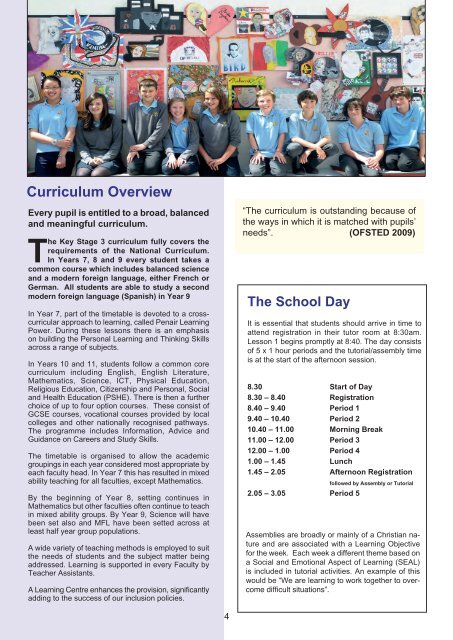Prospectus - Penair School
Prospectus - Penair School
Prospectus - Penair School
Create successful ePaper yourself
Turn your PDF publications into a flip-book with our unique Google optimized e-Paper software.
Curriculum Overview<br />
Every pupil is entitled to a broad, balanced<br />
and meaningful curriculum.<br />
The Key Stage 3 curriculum fully covers the<br />
requirements of the National Curriculum.<br />
In Years 7, 8 and 9 every student takes a<br />
common course which includes balanced science<br />
and a modern foreign language, either French or<br />
German. All students are able to study a second<br />
modern foreign language (Spanish) in Year 9<br />
In Year 7, part of the timetable is devoted to a crosscurricular<br />
approach to learning, called <strong>Penair</strong> Learning<br />
Power. During these lessons there is an emphasis<br />
on building the Personal Learning and Thinking Skills<br />
across a range of subjects.<br />
In Years 10 and 11, students follow a common core<br />
curriculum including English, English Literature,<br />
Mathematics, Science, ICT, Physical Education,<br />
Religious Education, Citizenship and Personal, Social<br />
and Health Education (PSHE). There is then a further<br />
choice of up to four option courses. These consist of<br />
GCSE courses, vocational courses provided by local<br />
colleges and other nationally recognised pathways.<br />
The programme includes Information, Advice and<br />
Guidance on Careers and Study Skills.<br />
The timetable is organised to allow the academic<br />
groupings in each year considered most appropriate by<br />
each faculty head. In Year 7 this has resulted in mixed<br />
ability teaching for all faculties, except Mathematics.<br />
By the beginning of Year 8, setting continues in<br />
Mathematics but other faculties often continue to teach<br />
in mixed ability groups. By Year 9, Science will have<br />
been set also and MFL have been setted across at<br />
least half year group populations.<br />
A wide variety of teaching methods is employed to suit<br />
the needs of students and the subject matter being<br />
addressed. Learning is supported in every Faculty by<br />
Teacher Assistants.<br />
A Learning Centre enhances the provision, significantly<br />
adding to the success of our inclusion policies.<br />
4<br />
“The curriculum is outstanding because of<br />
the ways in which it is matched with pupils’<br />
needs”. (OFSTED 2009)<br />
The <strong>School</strong> Day<br />
It is essential that students should arrive in time to<br />
attend registration in their tutor room at 8:30am.<br />
Lesson 1 begins promptly at 8:40. The day consists<br />
of 5 x 1 hour periods and the tutorial/assembly time<br />
is at the start of the afternoon session.<br />
8.30 Start of Day<br />
8.30 – 8.40 Registration<br />
8.40 – 9.40 Period 1<br />
9.40 – 10.40 Period 2<br />
10.40 – 11.00 Morning Break<br />
11.00 – 12.00 Period 3<br />
12.00 – 1.00 Period 4<br />
1.00 – 1.45 Lunch<br />
1.45 – 2.05 Afternoon Registration<br />
2.05 – 3.05 Period 5<br />
followed by Assembly or Tutorial<br />
Assemblies are broadly or mainly of a Christian nature<br />
and are associated with a Learning Objective<br />
for the week. Each week a different theme based on<br />
a Social and Emotional Aspect of Learning (SEAL)<br />
is included in tutorial activities. An example of this<br />
would be “We are learning to work together to overcome<br />
difficult situations”.<br />
<strong>Penair</strong> <strong>Prospectus</strong> 12-13_FINALsapcov1.indd 6 05/09/2012 22:10


